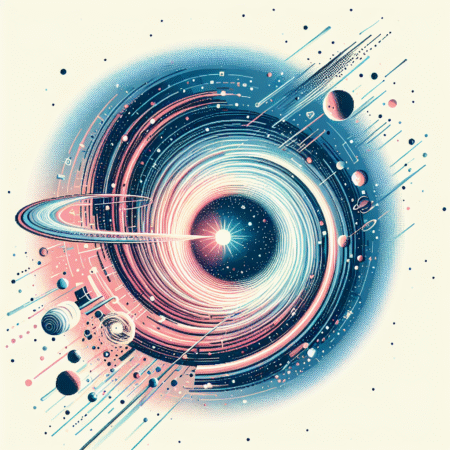Bending the Fabric of Reality: Exploring Wormholes
Have you ever wondered what it would be like to travel across the universe in the blink of an eye? Imagine stepping through a door and instantly finding yourself on another planet, or even in a different time. This thrilling idea isn’t just the stuff of science fiction; it’s rooted in the theories of modern physics. Welcome to the world of wormholes—kooky tunnels in the fabric of spacetime that might just rewrite the rules of travel and existence.
The Science of Wormholes
Wormholes, often described as “shortcuts” in spacetime, stem from the equations of General Relativity, formulated by Albert Einstein. Think of spacetime as a two-dimensional sheet. If you fold this sheet, two points that seem far apart become directly connected. That’s the essence of a wormhole—a bridge between distant places in the universe.
Imagine a cosmic highway. Wormholes may offer travelers routes not just across galaxies but potentially through time too. Although we have yet to discover a wormhole, theories suggest they could exist. Physicists even speculate that the universe might have its own natural wormholes, waiting for someone smart enough—or brave enough—to locate them.
The “What-if” Scenarios
Now, let’s dive into the imaginative realm of “what-ifs.” What if we could use wormholes to time travel? Picture this: You step into a wormhole and emerge in ancient Greece, mingling with philosophers like Socrates or Plato. Or imagine taking a leap forward to witness a future where renewable energy powers our cities. The possibilities stretch infinitely, prompting rich discussions about time, destiny, and our moral responsibilities.
What if we encountered our alternate selves? Would we strike a deal with a version of ourselves living in a parallel universe? Would we choose to change our paths or stick with our current life? Each scenario opens up a trove of complex questions about identity and fate.
Global Impact and Ethical Dilemmas
The potential for traveling through wormholes raises critical questions about society and humanity’s future. If instant travel became a reality, how would it affect global cooperation? Would powerful nations monopolize these technologies, leaving others behind? On the one hand, wormholes could unite civilizations by making travel and trade instantaneous. However, they could also exacerbate inequalities, giving a select few unprecedented advantages.
Ethical considerations add another layer of complexity. Would we have the moral right to intervene in past events? If we could correct historical wrongs, would we? Alternatively, how would our actions in one universe ripple across countless others? Decisions could carry unwitting consequences, leading us to rethink our responsibilities.
Wormholes prompt us to reflect on our very nature. How do we perceive time and existence? Are our lives a linear path, or is it a swirling tapestry with threads connecting multiple realities? These questions challenge us to consider our role in the cosmos.
Exploring the tantalizing concept of wormholes isn’t merely an academic exercise. The implications stretch far beyond the realm of science. As we peer into the universe, we confront truths about ourselves. How do we define progress? Are we alone in our struggles? Through this exploration, we recognize our place in the grand tapestry of existence.
The journey into wormholes inspires us to look beyond current human limitations. It encourages curiosity and imagination. With each step, we shape a narrative not just about the universe but about humanity’s quest for knowledge and understanding.
Many scientists and thinkers like Michio Kaku and Kip Thorne explore these ideas further. Their works challenge us to dream bigger and look deeper into the folds of time and space. As we grapple with these concepts, we invite a world of possibilities—one that bridges science and philosophy.
So, the next time you gaze at the stars, consider this: What if our universe holds secrets waiting to be uncovered? What if wormholes could transform our understanding of time, reality, and our very existence? The bounds of imagination extend as far as the universe itself, urging us to embrace the unknown and question everything we think we know.
Expand Your Tech Knowledge
Stay informed on the revolutionary breakthroughs in Quantum Computing research.
Discover archived knowledge and digital history on the Internet Archive.
OPED_V1

